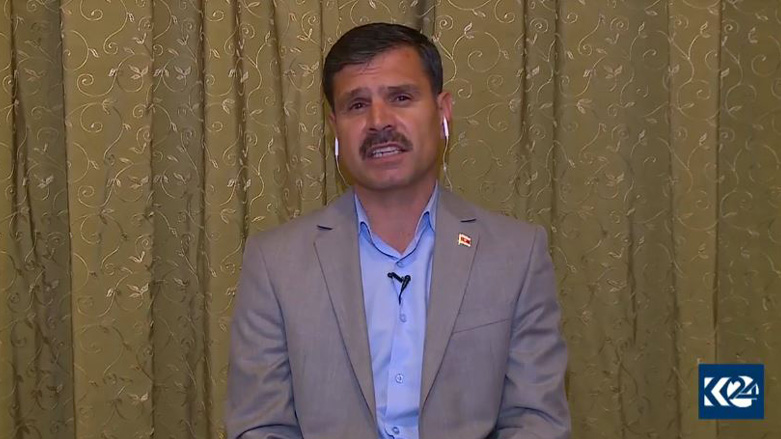Ezidi Commander: Baghdad and Erbil must cooperate to provide security

ERBIL (Kurdistan 24) – A Yezidi (Ezidi) commander on Sunday stated that his people are dissatisfied with the current leaders and called on Baghdad and the Kurdistan Regional Government (KRG) to work together in stabilizing the “Kurdish areas.”
Haider Shasho, Commander of the Ezidkhan Protection Force in Sinjar (Shingal), said he hopes people from “Kurdish areas” would be in positions of power over “administration and protection from Khanaqin to Sinjar,” referring to the opposite ends of areas contested between the central and regional governments. Ezidikhan, the name of the unit, means "Land of the Ezidis."
Members of the religious minority, having lived mostly in the Iraqi province of Nineveh in Iraq, were one of the primary victims of the Islamic State (IS). Thousands of them remain displaced from their homes or are unaccounted for.
Following the 2014 emergence of IS in Mosul, Iraqi security forces abandoned the area, leaving behind heavy weaponry and military equipment in the hands of the jihadist group. This allowed them to quickly expand, invading nearby towns and cities, especially those not sufficiently protected such as the Ezidi-majority city of Shingal.
On Aug 3, 2014, IS fighters stormed Shingal, kidnapping and enslaving thousands of Ezidi women and girls and carrying out large-scale executions of hundreds of members of their community.
Peshmerga forces, with the support of US-led coalition air strikes, retook Shingal in a military operation staged in November of 2015.
Iraq declared victory over the IS in December 2017 after sustained campaigns by Iraqi and Kurdish forces, supported by the US-led coalition, weakened the organization considerably.
Peshmerga were later forced to withdraw from the disputed territories in October 2017 following an attack by Iraqi forces and Iranian-backed Shia militias in response to the Kurdistan Region’s controversial referendum on independence.
The central government is currently in charge of “security and administration” of these areas, which many local officials consider insufficient to stave off IS insurgent attacks. Bombings, ambushes, and kidnappings, on the rise, occur mainly in the provinces of Kirkuk, Diyala, and Salahaddin.
Kirkuk Provincial Council Head Rebwar Talabani claimed, “the militants [threatening the area] are the same group of men who took over Mosul in a few hours.” He warned that Kirkuk is “a much smaller target,” and could be vulnerable to IS, even in its depleted numbers.
On Wednesday, Kurdistan Region Prime Minister Nechirvan Barzani announced that the Iraqi federal government has not yet officially requested a deployment of Peshmerga forces to the disputed territories, but that he would welcome such a request.
“So far, there have been no official meetings between Baghdad and us to send Peshmerga [to Kirkuk] to support them [Iraqi forces],” Barzani told reporters during a press briefing in Erbil.
Shisho, the Ezidi commander, continued. “We hope that in the near future, the Kurdistan Regional Government (KRG) and Baghdad reach an agreement,” where the authorities “include locals in the protection of the region so that we do not become the victims of political disputes between the governments.”
“Shingal is currently under the control of Hashd al-Shaabi” militias, he said, adding that “the people are not happy with their rule."
“There will be no peace without cooperation between both sides.”
Editing by John J. Catherine
